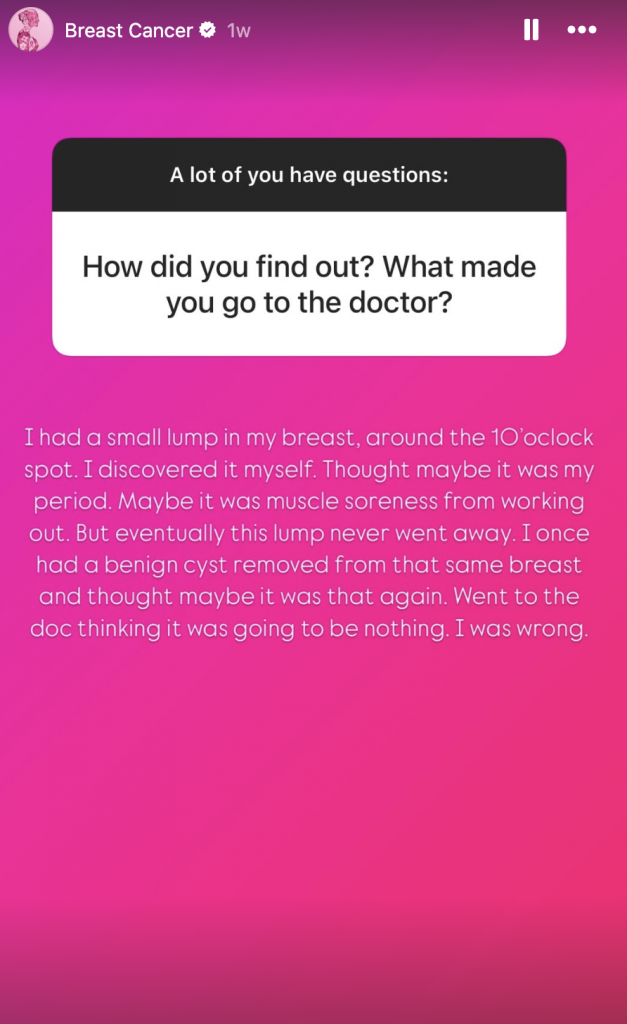Catching Her Cancer
- Bachelorette alum Katie Thurston, 34, is alerting her followers on a key symptom she nearly brushed off ahead of her cancer diagnosis — breast pain and a small lump she thought was due to her period or muscle soreness.
- The newly-engaged reality star, who just moved to New York City from Los Angeles with her fiancé, comedian Jeff Arcuri, 37, just devastated fans with her personal health news on February 15, disclosing that she has invasive ductal carcinoma, which is when cancer forms in the milk ducts of the breast.
- While small, harmless cysts and breast pain are common — and can come and go with your menstrual cycle — it’s a good idea to get it checked out if the symptoms don’t go away.
The newly-engaged reality star, who just moved to New York City from Los Angeles with her fiancé, comedian Jeff Arcuri, 37, just devastated fans with her personal health news on February 15. “I experienced a range of emotions over the past two weeks,” she wrote on Instagram. “Despair. Anger. Sadness. Denial. And then strength. Purposeful. Ready.”
Read More
“Went to the doc thinking it was going to be nothing. I was wrong,” the Renton, Washington native, who works as a bank marketing manager, wrote in a Q&A on her Instagram Stories, which she highlighted in a series titled “Breast Cancer.”

Katie, who said she once had a benign (non-cancerous) cyst removed from the same breast, noted that the pain “probably led to more doubt and delay in getting it checked out, as lots of sites will say ‘most breast cancers don’t hurt.'”
She also mentioned that she tested negative for a BRCA1 or BRCA2 gene mutation, and shared that she has no family history of breast cancer — all common misconceptions for some women assuming they are “in the clear” from ever having to receive a diagnosis, but unfortunately that is not the case.

1 out of 8 women will get breast cancer at some point in their lifetime. And while genetics and carrying the gene mutations will up your risk of breast cancer, around 80% of people who are diagnosed do not have a family history.
So while small, harmless cysts and breast pain are common — and can come and go with your menstrual cycle — it’s a good idea to get it checked out if the symptoms don’t go away. Thankfully, Katie did.
Symptoms of Breast Cancer
Being aware of how your breasts normally look and feel is an important factor when it comes to breast cancer detection. Doing regular self-exams is one way to familiarize yourself with how your breasts normally feel so that you will be able to identify anything out of the ordinary like a lump or hard mass.
Below are some other symptoms to look out for:
- New lump in the breast or underarm (armpit)
- Any change in the size or shape of the breast.
- Swelling on all or part of the breast
- Skin dimpling or peelingBreast or nipple pain
- Nipple turning inward
- Redness or scaliness of breast or nipple skin
- Nipple discharge (not associated with breastfeeding)
Of course, these symptoms can be due to things other than cancer. And again, a lot of women experience breast tenderness during certain times in their menstrual cycles. If you’re worried talk to your doctor about it. They may want to perform an exam, or schedule a mammogram, in addition to other tests, just to be safe.
An In-Depth Guide With Advice From Leading Experts for Every Step of Your Breast Cancer Journey
Listen to Your Body & Advocate for Yourself
In her 20s, Khan says she told “every doctor I ever saw” about a small but hard tissue build-up underneath her right breast.
“After all, breast cancer runs in my family on both sides,” she says, adding that her maternal grandmother and paternal aunt both died from breast cancer. “One physician even sent me for a mammogram being that young,” she continues, “but nothing alarming popped up.”
Advocating For Yourself While Navigating the Medical World
However, in her 30s, “the tissue build-up was getting bigger, and painful, causing part of my breast to visibly begin changing shape.” She sought medical attention, and after a mammogram, an ultrasound, and an MRI, she went in for a biopsy that confirmed her worst fear: breast cancer.
“You never think about what’s going to happen to you,” Khan says, “so, I really hope that women who are watching, women who are my age, who might be younger, like, go get it done, self exam, get a mammogram, get that ultrasound, push for that scan, push for that next test.”
Handling Fear When You Get the Diagnosis
Cancer is said to be one of the most challenging experiences for a human to go through. It would be very out of the ordinary if you weren’t scared. Anxiety and fear are totally normal reactions to the news that you have breast cancer. Acknowledging these emotions can be therapeutic and important to the healing process.
So how do you confront your fears without letting them take over entirely?
1. Let your family and close friends know and let them help. So many cancer survivors tell us they want and need support but are often too preoccupied to make specific requests. Urge those close to you to jump in with whatever practical help they can offer.
2. Keep a journal. It can be extremely cathartic to let those feelings loose on paper. Grab a pen and a nice journal and chronical your different thoughts throughout the day.
3. Join a cancer support group. There are groups in nearly every community offering opportunities to connect with others going through a similar journey. You’ll learn incredibly helpful insight from others who can tell you about what to expect and how to stay strong on tough days.
4. Consider seeing a therapist. Ask your doctor to refer you to a therapist so you can discuss your fears and concerns in a safe space. Often, vocalizing your thoughts and feelings rather than internalizing them can provide relief.
Above all, just know that there are countless resources and support here for you to turn to at any time. We’re fortunate to be in a time where we can rely on so many entities to help us through life’s hurdles.
Feel the Fear, and Let it Go — Meditation for Cancer Survivors
Contributing: SurvivorNet staff
Learn more about SurvivorNet's rigorous medical review process.

